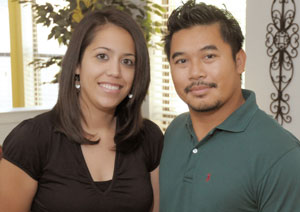CAMPUS
BUZZ
Mavericks Personified: Sunny Soeun
Undaunted by a harrowing past, alumnus now helps others persevere
aroeurn “Sunny” Soeun can empathize with students who feel they don’t quite fit in. The Irving Nimitz High School history teacher came to the United States as a boy, speaking no English and bewildered by a new country and customs.

Sunny Soeun (’06 BA) and his wife, Marissa (’03 BA), have two daughters. Sunny wrote Scars of a Lifetime so his children would have a record of his life as a Cambodian refugee.
Born in Cambodia in 1977, Soeun endured one of that country’s bleakest periods. Ruled by the genocidal Khmer Rouge, the Cambodian population was decimated from 1975-79. Remembered mainly for the deaths of 1.5 million people—20 percent of the population—the Khmer Rouge also was responsible for the emigration of additional thousands.
Like many others, Soeun’s family escaped through the jungle to a refugee camp in Thailand. Eventually, with the help of American missionaries, they settled in West Texas.
For years after coming to America, Soeun would lie awake at night reliving his chaotic childhood, the family’s improbable escape and his school days as a foreigner in Abilene. Finally, the 2006 UT Arlington graduate decided to put his thoughts on paper, a sort of memorial to those who didn’t survive the horror in Cambodia, as well as a way to share the past with his wife and children.
“My wife was expecting our second daughter, and I began wondering what they would do if something happened to me,” Soeun explained. “I wanted my children to have a record of my life as a refugee.
“We came to America with nothing but the clothes we wore and our papers in a plastic bag. I wanted them to know what it was like to grow up as a refugee in a completely different culture—to struggle to fit in. I wanted to show them that they could get through difficult times, too.”
Soeun’s hard times began even before his birth. With the Khmer Rouge leading a radical form of agrarian communism, almost all of Cambodia’s people had to work on collective farms or forced labor projects. Intellectuals and those who served in the previous government were executed—along with their entire families—so Soeun’s father, a former soldier, had to keep his past a secret.
Soeun’s earliest memories focus on the collective farm, where his parents worked more than 14 hours a day and food was scarce. At one point he became ill, and the family feared he would die. With no medical help available (“the Khmer Rouge withheld all medications and treatments from people they felt were useless to them”), Soeun’s parents took him to a different kind of healer.
Although he no longer recalls exactly what happened, Soeun knows that the treatment involved fire and burning—he still bears the scars. But it worked. He began eating again and soon was an active, inquisitive child. Some 20 years later, he would write of the experience in his book, Scars of a Lifetime.
– Saroeurn “Sunny” Soeun
Even with Soeun’s health restored, the family continued to struggle, eventually realizing that they must flee Cambodia to survive. As told in the book, their nighttime escape through the jungle was terrifying. Nostrils filled with the stench of rotting corpses, they dodged bullets and booby traps as they ran to the Thai border.
From Thailand the family made it to Abilene, a totally foreign place that presented a different set of challenges. In this new world, everyone looked different, talked differently and ate differently. Nothing was the same.
Soeun persevered, graduating from high school and enrolling at Texas Tech, where he met his future wife. Disenchanted with life in Lubbock, the couple moved to the Metroplex. Soeun began his studies at UT Arlington and graduated with a degree in history.
Today the former refugee is a U.S. citizen and teacher/coach.
“I became an American citizen on my birthday three years ago,” he says proudly. He often works with high school students who also have immigrant roots.
“I sometimes use my life story in classes at school. I work with kids who have tough lives, but I try to teach them you can’t think that just because you come from a poor family the world owes you something. These kids need someone who believes they can do it, that they can succeed no matter what their background. I want to be that person.”
— Sherry W. Neaves
Other Stories
Deans named
for School of Urban and Public Affairs, Honors College
Study shows teen victims seek friends' help
United they stood
Supporters convinced legislators to trumpet the University’s research strengths
UT Arlington's new mace
Art meets Academia
Search
Contact Us
Office of University Publications
502 S. Cooper St.279 Fine Arts Building
Box 19647
Arlington, TX 76019-0647
